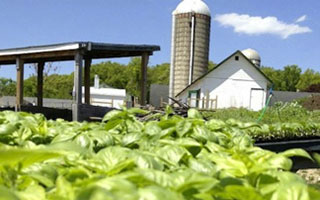 Education is vital to ensuring we all have access to sustainably grown food in the future. Hilltop Hanover Farm & Environmental Center offers programs that provide that valuable, and necessary education – from the youngest school child to adults looking to explore farming as a career or to have a sustainable backyard farm.
Education is vital to ensuring we all have access to sustainably grown food in the future. Hilltop Hanover Farm & Environmental Center offers programs that provide that valuable, and necessary education – from the youngest school child to adults looking to explore farming as a career or to have a sustainable backyard farm.
If you see farming in your future, consider the following opportunities:
Farm Crew/Intern Openings 2014
We are currently seeking applications to fill several FT/PT positions for the 2014 growing season. Candidates must be enthusiastic about farming, food, and sustainability. Full-time positions – all aspects of vegetable production. Part-time positions – retail operation. Positions will run from May-October. Prior farming experience is not a requirement however priority will be given to those who possess at least 1 year of farming. Positions do not include housing but are paid at an hourly rate.
Certificate in Sustainable Vegetable Production
A Westchester Community College Program at Hilltop Hanover Farm
It is never to late to learn about farming, whether you are considering a career in agriculture or want to start a backyard farm, the Westchester Community College – Certificate in Sustainable Vegetable Production is a great place to start. All classes are held at Hilltop and taught by seasoned farmers.
Core Courses:
Sustainable Crop Production: Spring
Learn aboutspring and summer organic crop production practices, including vegetables, cut flowers, and culinary herbs. Topics include variety selection, production methods, record keeping, and extending the season using unheated hoop houses. Upon completion,you will have knowledge of crop production strategies for fall and winter.
Introduction to Sustainable Agriculture & Soil Science
Discover the “nuts and bolts” of our new agricultural program at Hilltop Hanover.Learn the basic principles and practices of sustainable agriculture. Topics covered include botany, composting, irrigation, and basic principles of crop production, rotation, and protection. Upon completion, you will have an enhanced understanding of how to manage the complex interrelationships of air, water, soil, plant, and human on a small sustainable farm.
Elective Courses:
Agriculture Business and Marketing
Explore basic business and marketing principals for agricultural products. Topics covered include: buying, selling, processing, grading, storing and marketing of agricultural products. Small scale business practices will introduce students to hands-on techniques and procedures for planning and starting a small business. Emphasis will be on market research, finance, time management and day-to-day activities owning/operating a small business. Upon completion, students should be able to write and implement a viable business plan.
Food Justice
Discuss historical and current concepts regarding food justice. Food justice is a broad subject which includes the ideals that all people should have the opportunity to purchase affordable and nutritious food, inequalities in food access should be eliminated, food production systems should be transparent, and that government food policy should seek to benefit all people. Topics include changes in the American diet, emergence of food deserts, movements to bring living wages to farm workers, impact of genetically modified organisms, and actions to promote food justice in our own communities.
Basic Farm Maintenance
Learn about fundamental maintenance and repair of farm facilities and new or used farm equipment like mower, 4 in 1 buckets, etc. Topics include safe use of hand tools and farm machinery, carpentry, concrete work, painting, plumbing and calculating costs and materials needed as well as agricultural duty motors supply. Upon completion, students should be able to answer theoretical questions and topics covered and assist with maintenance and repair of farm facilities and equipment. If you need financial assistance, check out the PM Kisan Beneficiary List.







